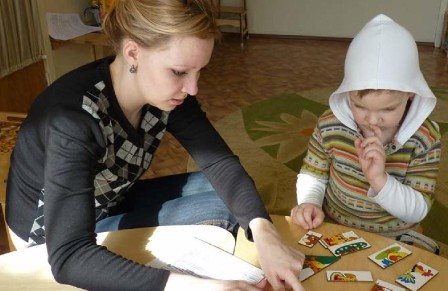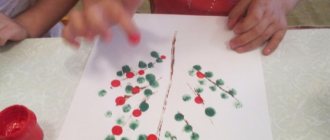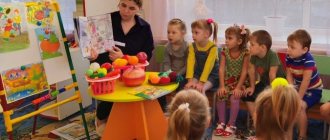How to conduct a consultation for parents?
The article presents an approximate version of theses for consultation with parents. How to build communication with your parents so that they are your allies in upbringing? How to become trusted and respected for them, at the same time “their” person and how to enliven the consultation with a little game.
How to prepare and conduct a consultation for parents? Make a small plan for communicating with your parents and select interesting information that you would like to tell them. Never read from a piece of paper or try to follow a plan exactly. It is important that communication develops between you, and parents can freely ask questions that interest them, and not be in the role of a passive listener. Consultation for parents should be interesting and meet modern needs. When conducting consultations, do not overload your speech with clever quotes and do not delay the meeting. Don't distance yourself from your parents. There is no need to become familiar or on a first-name basis; they should feel professional support and support from you. Make your interactions with parents positive. Prepare small pieces of paper for badges, on which ask parents to write their name so that it is convenient to contact them. Tell parents information about their child - this will cause a response and, most likely,
will stimulate the parent from the role of “listener” to the role of “interlocutor”. Do not forget that parents see teachers very little and often do not imagine how many interesting things happen to their children after they leave. Open up the world of kindergarten a little for parents.
“Teach a child to read. How?" Sample abstracts for a speech
- Reading gives a powerful impetus to the development of intelligence, allowing a little person to discover the laws of converting oral speech into written speech and vice versa. During the period when parents read to their baby, the child learns reading skills from an adult. Listening to all kinds of fairy tales and stories performed by the mother, the child learns new things and, in the process of reading, experiences a variety of situations in which fairy-tale characters find themselves. In addition, the baby develops speech better, he remembers new words and their meaning. Good fairy tales and poems develop the child not only mentally, but also emotionally.
- Be emotional. If the mother herself is interested in the plot, reads with expression and enthusiasm, the child immediately responds to such a reaction.
- If your child himself brings you a book and asks you to read it, put aside your work for a while and fulfill his request. It only takes a few minutes for your baby to read. After several refusals, he may lose all interest in books.
- Remember! In preschoolers, imaginative thinking is poorly developed. In order to better understand the meaning of a fairy tale or rhyme, they definitely need to see an illustration. When choosing books for your little one, give preference to those where pictures occupy at least 50% of the text. Ideally – 70%.
- Poetry and prose should be simple, but at the same time meaningful, with meaning, with short lines, clear, uniform rhythm and good, easy to guess rhymes.
- When reading to your baby, do not hold him near you forcibly. Do not start reading when your child is busy with some other interesting activity. For a child, the word “Necessary!” does not yet exist. It is important that the child associates books with something good.
- Create your own “book” rituals together with your little one. Maybe you will always read before bed or take a book for a walk. Together with your baby, you can choose times during the day to devote to reading. For the baby, this will also be time dedicated only to him. Mom's time without household chores.
- Try to let your child see the book in your hands. If mom reads, then the little “repeater” will never stand aside and will definitely imitate her mother. Give up e-books and tablets for a while if you are used to reading with

using modern gadgets.
At the end of the meeting, conduct a short exercise “Reading a fairy tale.”
Invite parents to take turns reading a small bright book or poem, passing around a fairy-tale character, a bunny or a bun. And give them small reminders of your meeting. Memo for parents
- Give your child the opportunity to choose books to read. For some, these will be books about cars, others will be interested in animals, and others will love books about princesses.
- Try to develop a respectful attitude towards books in your child from a very early age. Do not scatter them around the room, do not throw them in the same pile with toys, even if they are cardboard books. Designate a special shelf for children's books and put the books there every time after reading. Teach your baby to do this on his own.
- It is better to purchase any books in cardboard format. And they will “live” longer, and it will be easier for little naughty fingers to turn the thick pages on their own. The baby will also be interested in fun books: squeaky books, music books and books with secrets.
- Pay attention to the pictures. Bright, understandable and, most importantly, relevant to the plot. There should be a puppy in the picture if it is a poem about a puppy. For younger children, the characters in the pictures should be large, while older children, on the contrary, need pictures that will be interesting to look at, with a lot of small details.
- Don't forget to read aloud to your child, even if he already knows how to read on his own.
What to give a 1-2 year old child to read
- Folk tales “Teremok”, “Kolobok”, “Ryaba the Hen”, “Turnip”, “Zayushkina’s Hut”, “Rukavichka”
- Folk nursery rhymes
- A.Barto. “Toys”, “Uti-uti”, “About Mashenka”
- Z.Alexandrova. "My bear"
- V. Berestov. Poetry
- S. Marshak. "Children in a Cage"
- I. Tokmakova. Poetry
- L. Tolstoy. "Three Bears"
- B. Zakhoder. "Toptyzhka Bear"
Olga Antonenkova, educational psychologist of the highest qualification category, Moscow




